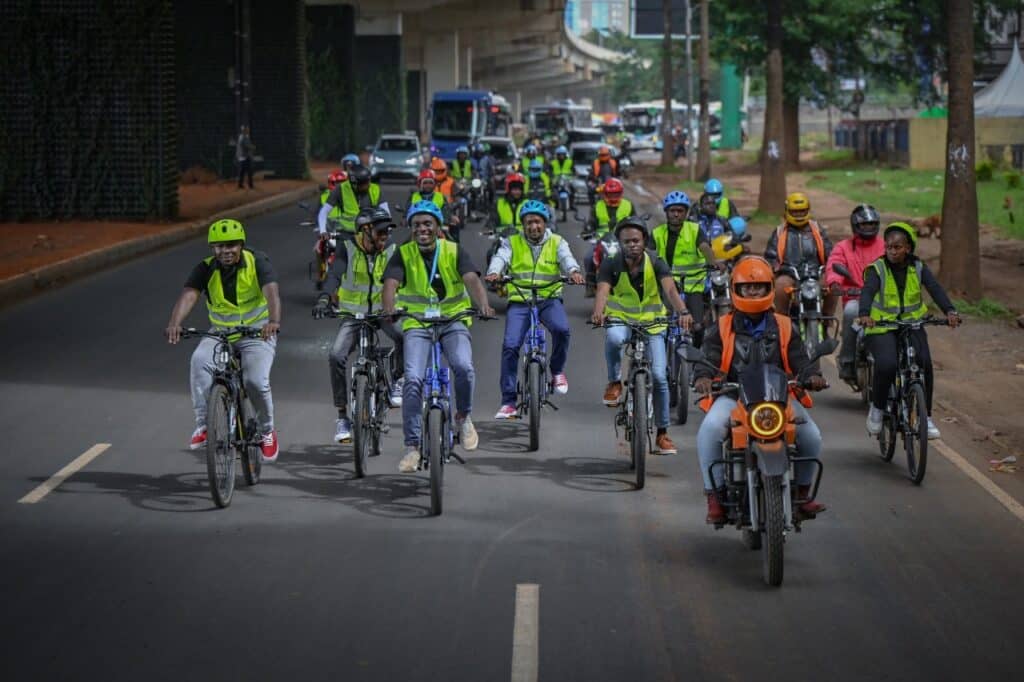
As the world grapples with environmental challenges, embracing electric mobility has emerged as a crucial step towards mitigating carbon emissions and building a more sustainable transportation network. Spanning a range of vehicles, from electric bicycles to motorbikes, cars, buses as well as trucks, and encompassing essential infrastructure like charging stations and renewable energy integration, this shift signals a transformative leap towards sustainability.
The launch of the Kenyan Draft National E-mobility Policy on 27 March 2024, marked a significant milestone in the transition towards sustainability. With the unveiling of the policy, Kenyans embark on a journey towards innovation, collaboration, and progress.
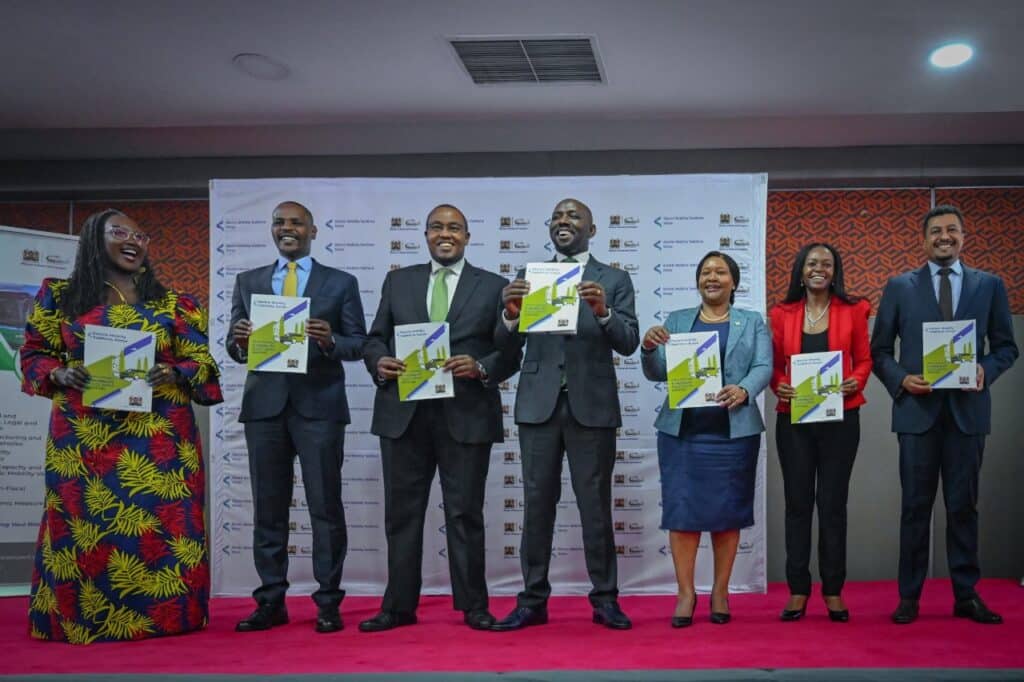
GIZ’s Promotion of E-mobility in Kenya project has played a pivotal role in laying the groundwork for this transition, supporting the development of the Draft National E-mobility Policy that promises to reshape the future of transportation in the country. Spearheaded by the Ministry of Roads & Transport, the project has been instrumental in supporting the national Electric Mobility Taskforce, which was established on 4th August 2023 and mandated to develop a comprehensive policy framework for the e-mobility sector.
The Promotion of E-mobility in Kenya project enlisted the expertise of both national and international consultants, including Dr. Eng. Samuel Roy Orenge and the Cities Forum, to provide invaluable insights and guidance. Their collaborative efforts have culminated in the official launch of the Draft National E-Mobility Policy, a landmark event presided over by the Cabinet Secretary, Ministry of Roads & Transport, Hon. Kipchumba Murkomen. EGH.
The significance of this moment was underscored by Hon. Murkomen’s arrival at the launch venue riding on an electric vehicle, setting a powerful example for the transition towards cleaner transportation alternatives. Accompanied by a fleet of Electric Vehicles (EVs), his entrance symbolized a tangible step towards reducing carbon emissions and combating climate change. Hon. Rebecca Miano, EGH, Cabinet Secretary of the Ministry of Investment, Trade & Industrialization, also graced the occasion, highlighting the intersectionality of e-mobility with industrialization and investment initiatives.
To further support this sector, the Ministry (MITI) has developed an Automotive Policy to stimulate the assembly and manufacture of vehicles, with a specific focus on electric vehicles.
Hon. Rebecca Miano, Cabinet Secretary, Ministry of Investment, Trade & Industrialization
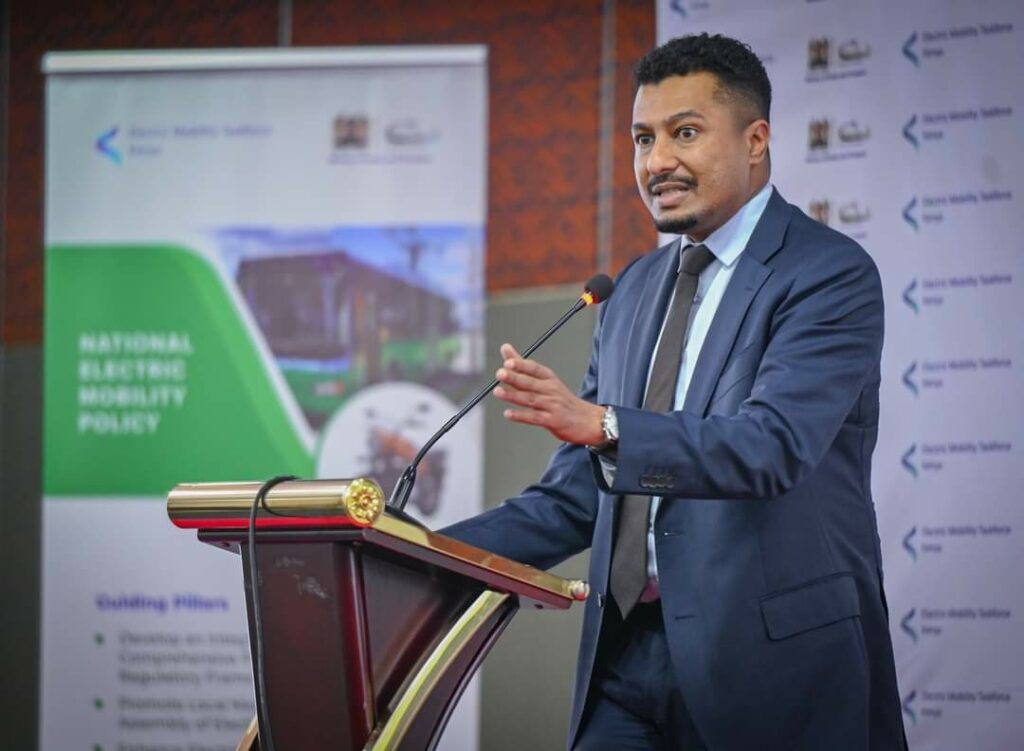
Daghar also emphasized the role of e-mobility in the Government’s Bottom-Up Economic Transformation Agenda (BETA) and its potential to create job opportunities, especially for Kenya’s youth. Others in attendance included Principal Secretary for Environment and Climate Change, Eng. Festus K. Ng’eno, Kenya Private Sector Alliance (KEPSA) CEO, Carol Kariuki and other development partners; FCDO, IFC and World Bank. During the launch, Hon. Murkomen announced several measures aimed at incentivizing the adoption of EVs.
For our part, we have begun the process of assigning, green-colored number plates to all electric vehicles, including two-wheelers. Special plates will help raise awareness about EVs among the public and encourage more people to consider switching to e-mobility. We are also setting up charging infrastructure at Transcom House, the headquarters of the Ministry of Roads and Transport.
Hon. Onesimus Kipchumba Murkomen, EGH SDOT Kenya
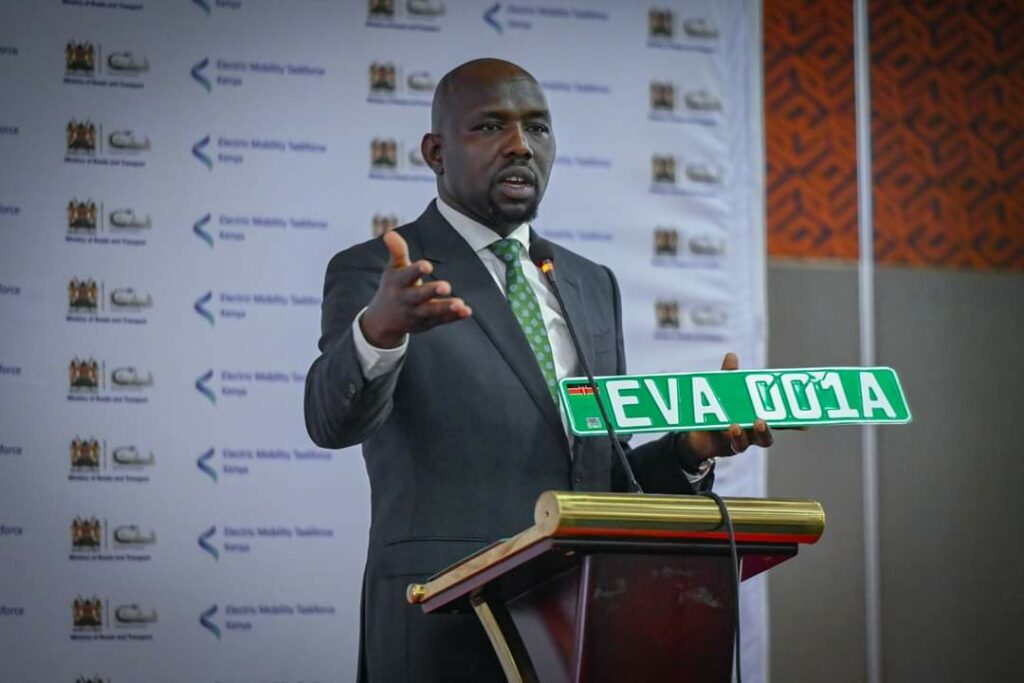
Other benefits highlighted include greenhouse gas emission reduction, lower operating costs, decreased reliance on imported fuels, and the creation of green jobs. The provision of free parking spaces for e-buses would for example demonstrate a commitment to fostering an EV-friendly environment.
The Draft National E-Mobility Policy outlined seven key pillars that will guide the development of e-mobility across various transportation modes, including roads, rail, air and maritime. The pillars include:
From promoting local manufacturing and assembly for EVs to enhancing infrastructural capacity and technical skills, each pillar is designed to accelerate the adoption of EVs while fostering socio-economic development. With incentives, subsidies, and support mechanisms, Kenya is paving the way for businesses and individuals to embrace e-mobility with open arms. Whether manufacturers are looking to produce EVs or a consumer is considering making the switch, this policy offers something for everyone. Measures to enhance gender equality and social inclusion in the e-mobility ecosystem, aiming to incentivize women, the youth, and people with disabilities to participate in e-mobility-related economic activities, have been provided on the policy, as well.
Looking ahead, the focus shifts towards public participation, where members of the public are invited to provide feedback and comments on the draft policy. This inclusive approach ensures that diverse perspectives are considered, enriching the policy framework, and enhancing its effectiveness in driving positive change. Achieving the goals requires collaboration on a global scale. The Draft National E-Mobility Policy recognizes the importance of partnership and engagement, bringing together stakeholders, experts, and communities to shape the future of mobility. Through dialogue, cooperation, and shared vision, Kenya can overcome barriers, address challenges, and create a transportation ecosystem that benefits everyone. Together as Kenyans, we can pave the way for a cleaner, more sustainable future!
As governments worldwide strive to embrace sustainable transportation solutions, the launch of The Draft National E-Mobility Policy of Kenya represents a significant step forward. However, the road to implementation is burdened with challenges that demand careful navigation. First among these hurdles is the need for extensive infrastructure development, including charging stations and grid upgrades, alongside incentives to spur private investment. Financial constraints loom large, requiring creative solutions to secure funding amidst budgetary pressures. Technological integration presents another formidable challenge, necessitating standards and regulations to ensure compatibility and safety within existing transportation systems. Moreover, public acceptance and awareness must be cultivated to overcome resistance to change and misconceptions about electric vehicles, underscoring the importance of robust communication strategies.
Interagency coordination emerges as a critical factor in the success of e-mobility policies, as multiple government entities must align efforts to avoid duplication and inefficiencies. Regulatory frameworks must strike a delicate balance between fostering innovation and ensuring consumer protection, amidst a backdrop of evolving market dynamics and global influences. The supply chain presents its own set of challenges, requiring sustainable practices and reliable access to critical materials. Data management and privacy concerns add further complexity, highlighting the need for secure systems and transparent policies. Ultimately, the successful implementation of e-mobility policies hinges on collaborative efforts among government agencies, private sector stakeholders, and the public to realize the vision of a cleaner, more sustainable transportation future.
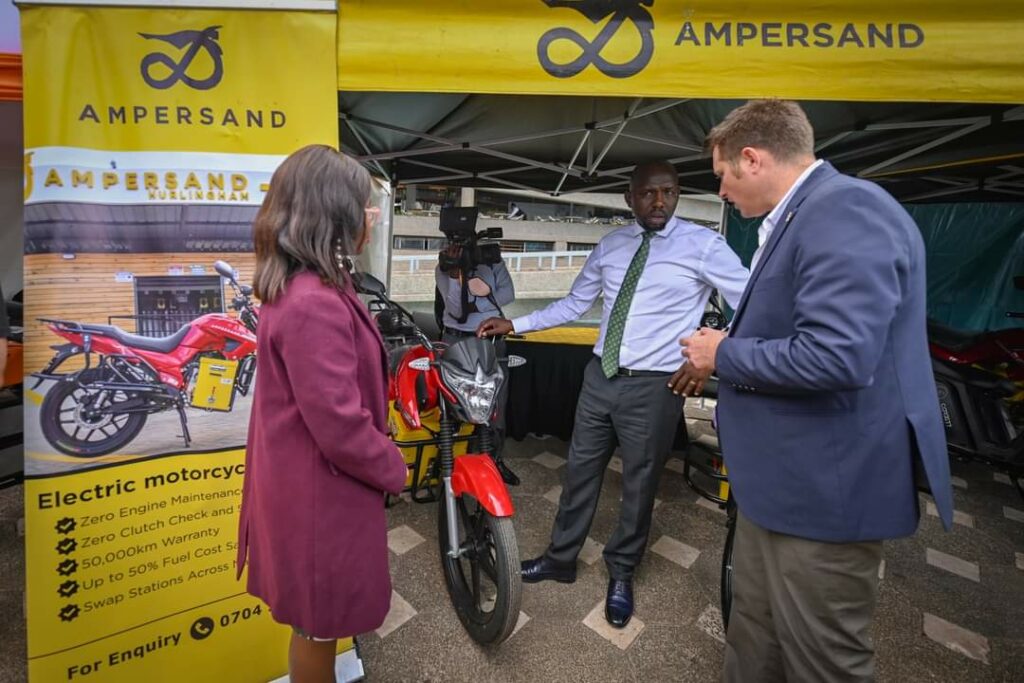
In conclusion, the launch of the Draft National E-Mobility Policy heralds a new chapter in our collective pursuit of sustainability. With its focus on innovation, collaboration, and inclusivity, this policy sets the stage for a revolutionary shift towards e-mobility in Kenya. As we navigate the challenges and opportunities ahead, let us use this inspiring example of Kenya’s ambition towards sustainable transport as a moment to drive positive change and build a transportation network that not only meets our needs but also preserves the planet for future generations. Together, let us pioneer progress towards a greener, cleaner, and more sustainable world.
The Promotion of Electric Mobility in Kenya project is implemented by GIZ and funded by the German Federal Ministry for Economic Cooperation and Development (BMZ).
 Electric Fleet entourage to the launch venue ©
Vincent Sende
Electric Fleet entourage to the launch venue ©
Vincent Sende

Jemimah Muli
jemimah.muli@giz.de
Visit profile